Strategies for the coupon- clipper crowd
- Share via
AMERICANS spend close to $2,500 on the typical summer vacation, one of the larger expenditures a family makes in a year. The fun of a great trip, however, quickly evaporates if there is a huge credit card bill to pay when you return home. Here are ways to trim expenses once you hit the road.
1. Ask for a break
Hotels, restaurants, car rental agencies and attractions, including theme parks and museums, often offer discounts to members of large groups, such as AAA or AARP. When making a reservation or checking in, always ask whether you are getting the lowest rate available. Hotels charge differing amounts for the same rooms depending on occupancy, what season it is and whether you are a member of a group.
2. Eat economically
Watch how many dollars you eat up on vacation. You can cut down by packing food and snacks. A picnic of sandwiches, fruit and beverages saves a family of four almost $50 over eating in a restaurant, says the Consumer Credit Counseling Service of Atlanta. Book a hotel that serves breakfast. In some destinations, especially Hawaii, it’s easy to find rental condos with full kitchens.
3. Pick your card
Not all credit cards are created equal, so think about which one you want to take, especially if you are going abroad. Bank of America, for example, charges its customers 3% over the wholesale exchange rate in premiums and transaction fees. American Express charges its customers a 2% premium over the wholesale exchange rate.
4. Be careful with the cash
ATMs can be a great way to get foreign currency once you get to a country. But before you leave, call the customer service number of your bank and ask how it calculates the exchange rate and what extras it tacks on for purchases in a foreign currency. Use your debit card rather than a credit card.
5. Shop for currency
Don’t just head to the airport exchange kiosk to buy foreign currency. Shop around. On a recent Wednesday, for example, ICE Currency Service in LAX charged customers $1.47 for a euro, plus a $4.95 transaction fee. But on the same day at the same time, discount exchanger International Currency Express in Beverly Hills asked $1.37 per euro and charged a $2 transaction fee. So 100 euros would cost $151.95 at the LAX exchange kiosk and $139 at ICE Currency Service, a 9.3% difference.
6. Be careful about commitments
Looking out a hotel window at an idyllic waterfront or gorgeous mountain range makes you want to stay forever, and hotel operators such as Marriott, Hyatt and Hilton sell time shares, a way to let you buy into that scene. A time share allows the owner to stay at a specific resort for a set week each year or, in some cases, allows the owner to book in a specific period such as ski season or summer. Time-share sellers always offer some sort of incentive -- free show tickets, a gift certificate or some other goodie -- to get prospective customers to attend a sales meeting. Don’t make a snap decision to buy, and don’t pay the full retail price.
7. Plan your activities
On cruises, think about creating your own shore excursions, says Stewart Chiron, who operates CruiseGuy.com website. This requires some research before you leave. Read travel books and go online, often to the cruise line’s own website to see what tourists do at the ports where you will stop.
8. Use public transportation
In New York, a seven-day, unlimited-use MetroCard is only $24 and is good for unlimited subway and local bus rides for seven days. In London, a three-day peak-use subway ticket for the central section of the city is $32, about the cost of one taxi fare.
9. Look for coupons
Pick up tourist booklets and magazines. They are full of coupons and special offers for restaurants, activities and attractions. Many resorts and destinations have similar publications. You can also check the Web.
10. Rough it
Camping is far less expensive than hotels and often is just as fun. Big Sur Campground and Cabins near one of the most scenic stretches of California’s Highway 1 has a range of amenities, including hot showers, a convenience store, laundries, playgrounds and swimming pools. The rate is $40 to $50 a night for four people.
More to Read
Sign up for The Wild
We’ll help you find the best places to hike, bike and run, as well as the perfect silent spots for meditation and yoga.
You may occasionally receive promotional content from the Los Angeles Times.







